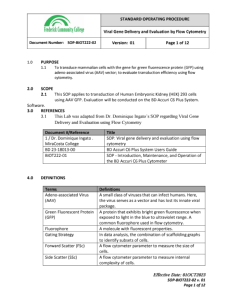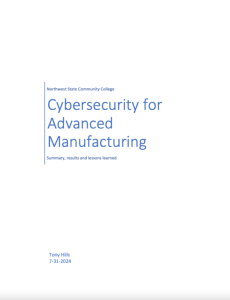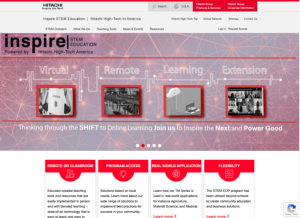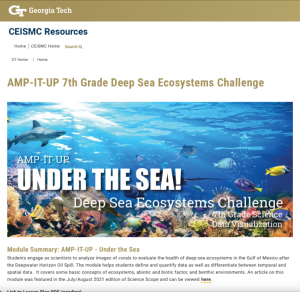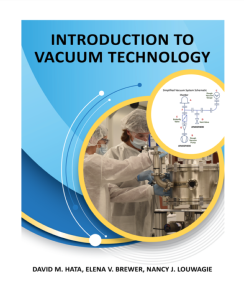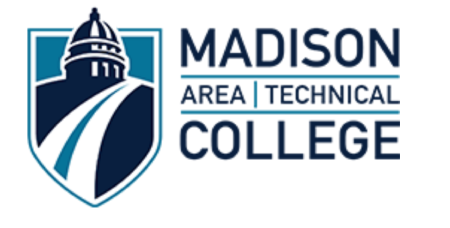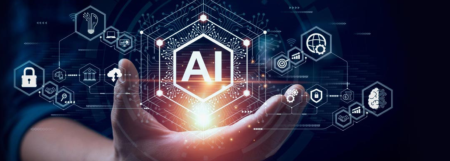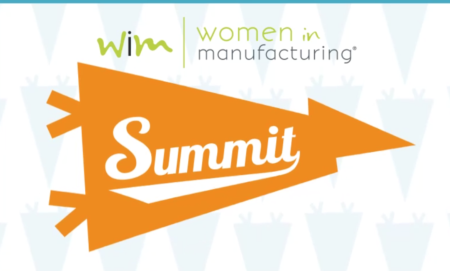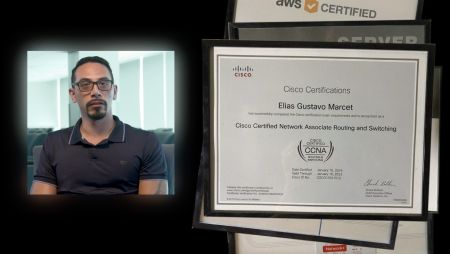ATE is Advanced Technological Education. With an emphasis on two-year colleges, the National Science Foundation's ATE program focuses on the education of technicians for the high-technology fields that drive our nation's economy.
2024 ATE Principal Investigators’ Conference
Conference
October 23 Washington, DC
The 2024 ATE Conference will be held on October 23-25 at the Omni Shoreham Hotel in Washington, D.C. The conference brings together more than 850 NSF ATE grantees and their project partners to focus on the critical issues related to advanced technological education. Key people working on ATE projects across the country will participate in the event. Conference participants represent community colleges, business and industry, secondary school systems, and four-year colleges covering projects in a wide variety of areas, such as advanced manufacturing technologies, agricultural and environmental technologies, biological and chemical technologies, engineering technologies, information and security technologies, micro and nanotechnologies, and others.
(View More)
Space Ag Conference @ Grand Farm
Conference
October 24 Fargo, ND
Space Ag Conference seeks to explore the potential of advanced agriculture technologies to transform the AgTech industry in space, with the understanding that solutions to space-based challenges can often be applied to those on Earth.
Our world’s production system is undergoing a dramatic shift towards sustainable practices and greater food security. Space agriculture and the technology it provides could help farmers produce higher crop yields with less land and energy. This is our opportunity to dream big and envision a bold future for agriculture
Goals of the Conference:
- Encourage the next generation of innovators to dream
- Explore agricultural possibilities through the lens of space
- Showcase the challenges of space agriculture
- Speed up collaboration and innovation
- Highlight cooperation with NASA + space industry leaders
(View More)
2024 Great Lakes Cybersecurity Capabilities and Careers Symposia
Summit
October 25 St Paul, MN
Five symposia provide the opportunity to learn, experience, and discuss the latest tools, techniques, and technologies for Teaching, Practicing, Demonstrating, and Showcasing Cybersecurity Capabilities.
3CS includes a symposium in each of the five areas below.
- Community College Cyber Summit
- Cybersecurity Science and Practice Symposium
- Cybersecurity Capability Maturity Symposium
- Cyber Technology and Careers Symposium
- Cyber Games, Simulations, and Competition Symposium
(View More)
2024 ATMAE Annual Conference
Conference
October 28 Las Vegas, NV
Join the premier event in technology, management, and applied engineering – the ATMAE Annual Conference at the Plaza Hotel in Las Vegas, taking place from October 28-31, 2024. This conference is for post-secondary educators, administrators, students, and representatives from business and industry who are passionate about advancing their knowledge and skills in these critical fields. Immerse yourself in a dynamic environment where cutting-edge developments, innovative practices, and groundbreaking research take center stage. With a diverse array of attendees, the conference provides a unique platform for networking, collaboration, and the exchange of ideas. Explore state-of-the-art exhibits and seize valuable sponsorship opportunities to showcase your organization's commitment to technological advancements and applied engineering.
(View More)
NRSC and DeafTEC Math and Science Conference
Conference
October 28 Rochester, NY
Join DeafTEC for their first-ever Math and Science Conference this year. In the past, math-only conferences have been hosted by DeafTEC, but this year, they are incorporating science topics into this conference. The aim of the Math and Science Conference is to bring together teachers of deaf and hard-of-hearing students from middle school to community college to collaborate on a variety of math and science topics.
This conference, brought to you by Rochester Institute of Technology’s NTID Regional STEM Center and DeafTEC, will be held at NTID on October 28-30, 2024.
There is no cost to attend this conference, but registration is required. Sign language interpreters and CART services will be provided for all workshop sessions. Please make note of any other accommodations needed when registering.
(View More)
Aerospace Alley Future Workforce Opportunities Fair and Tradeshow
Student Event
October 31 Hartford, CT
Aerospace Component Manufacturers (ACM) Aerospace Alley Future Workforce Opportunities Fair and Tradeshow held at the Connecticut Convention Center. AMT Coordinators will table at the event to educate local high schools and middle school students about the many career opportunities in aerospace manufacturing. CT State Community College campuses Asnuntuck and Manchester will be exhibitors. This event allows CT State students, instructors, and staff to network with area companies for internships, job placement, and potential tours/guest speakers for our Career Awareness in Manufacturing class. It is a great networking event for all who attend.
(View More)
AVS 70th International Symposium & Exhibition
Conference
November 3 Tampa, FL
The AVS International Symposium and Exhibition addresses cutting edge issues associated with materials, processing and interfaces in both the research and manufacturing communities.
The weeklong Symposium fosters a multidisciplinary environment that cuts across traditional boundaries between disciplines, featuring papers from AVS Technical Division, Groups, Focus Topics on emerging technologies and more.
An extensive Exhibition of related equipment, tools, materials, supplies, chemicals, services, consulting, technical literature, and new technologies are showcased during the week.
(View More)
2024 IEDB Virtual User Workshop
Workshop
November 5 Online
The Immune Epitope Database (IEDB) is an important tool for developing immunotherapies and vaccines. The IEDB is also useful for educators who wish to incorporate undergraduate research in their classrooms. Dr. Sheela Vemu (Waubonsee Community College) has been using the IEDB with her students and as a team leader four of the Antibody Engineering Hackathons. She and her students were able to publish two peer-reviewed articles in the Journal of Advanced Technological Education (J ATE) and one protocol in QUBES. You can learn more about the IEDB in this virtual workshop.
Topics include:
- Overview of the IEDB curation process, database structure, and content. The different database query features will be demonstrated and a research example will be provided.
- Overview of the epitope prediction and analysis tools for both the Next-Generation tools and classic Analysis Resource.
- Specialized topics will be covered including specific tools, the IEDB application programming interface (API), and other areas of research, such as HIV and cancer.
(View More)
Experience Northland
Student Event
November 7 Thief River Falls, MN
Join Experience Northland on November 7, 2024. Brought to you by Northland and the National Center for Autonomous Technologies (NCAT), Experience Northland is open to all students (grades 7-12) and teachers. It offers a large variety of 50-minute hands-on learning activities directly related to Northland programs. Schools/students can choose to attend one session or make it a day-trip and attend sessions throughout the day. All sessions are 100% cost-free. Register soon.
(View More)
2024 Accessing Higher Ground
Conference
November 11 Denver, CO
Accessing Higher Ground is the annual conference of ATHEN, Access Technology Higher Education Network, one of AHEAD’ Associated Partners. The focus of this weeklong conference is accessible media, universal design and assistive technology in the university, business and public settings. Numerous educational sessions are offered on legal and policy issues, including ADA And 508 compliance, and the creation of accessible media and information resources, including Web pages and library resources. The conference brings together over 500 web designers, assistive technologists, ADA coordinators, disability resource staff, faculty members, course designers, media specialists and programmers, and IT and communication managers. The conference is held in Denver, Colorado in November of each year.
(View More)
Underwater Intervention Conference
Conference
November 12 New Orleans, LA
Underwater Intervention in collaboration with the Association of Diving Contractors International, and the ROV Committee of the Marine Technology Society, is returning alongside The International WorkBoat Show in New Orleans this year. Join November 12-14 at the Morial Convention Center for: An Innovative Exhibit Hall; Underwater Intervention Conference; and Sub Hub, Special Events, & Happy Hour.
(View More)
Pipe and Tube Conference
Conference
November 13 Omaha, NE
For Fabricators and Manufacturers Association members and the public, this conference includes valuable breakout sessions on key topics like robotics, automation, the latest inspection technology, and how to retain the talent you’ve worked hard to recruit.
(View More)
AI in Natural Sciences & Healthcare: A Hands-on Demonstration
Webinar
November 13 Online
Discover AI-driven innovations in natural sciences and healthcare. This session provides demos tailored for educational use.
(View More)
ATE Projects and Centers
Advanced Manufacturing Technologies topics include:
- Additive manufacturing
- Automotive manufacturing
- General manufacturing
Agricultural and Environmental Technologies topics include:
- Agriculture and aquaculture
- Environmental technologies
- Natural resources
- Nuclear power
- Solar energy
- Wind power
Bio and Chemical Technologies topics include:
- Biotechnology
- Chemical and process technologies
Engineering Technologies topics include:
- Electronics and controls
- General engineering
- Marine technologies
- Materials technologies
- Optics
- Space technologies
General Advanced Technological Education topics include:
- Evaluation
- Learning research
- Recruitment
- Teacher preparation
Information and Security Technologies topics include:
- Geospatial technologies
- Information and communications technologies
- Logistics
- Security, information assurance, and forensics
Micro and Nanotechnologies topics include:
- MEMS
- Microsystems
- Semiconductors
This 12-page resource, from Frederick Community College, is a standard operating procedure (SOP) for viral gene delivery and evaluation by flow cytometry. The SOP outlines the purpose, scope, definitions, references, safety measures, responsibilities, materials, and equipment involved in the procedure. Step-by-step procedures are included for transduction of mammalian cells with the gene for green fluorescence protein (GFP) using adeno-associated virus (AAV) vector and subsequent evaluation of transduction efficiency using flow cytometry.
Procedure steps include: transduction preparation, transduction of HEK293 cells, cytometer setup and calibration, starting up the cytometer, preparing for instrument QC, running instrument QC, preparation of transduced samples, setting up the acquisition parameters on the cytometer, creating sample gating strategy on the cytometer, sample acquisition, data analysis, and exporting the data. Detailed steps are included.
(View More)
This 15-page report, provided by the Cybersecurity Education for Advanced Manufacturing Organizations (CAMO) project, summarizes the build process for CAMO training scenarios, the results of implementing scenarios, and the lessons learned throughout. The training scenarios were developed by CAMO to address poor cybersecurity defenses in manufacturing organizations and the lack of security awareness among engineering technicians. The scenarios were designed to make cybersecurity instruction as accessible as possible, and can be used in both face-to-face and remote learning environments. The report provides an overview of the scenarios, discussing the content of each, their development, how to use them, and their impact on students. The scenarios have been used in high schools, two-year colleges, and four-year colleges. The report includes statistics on the efficacy of the each scenario. Also discussed in detail is the virtual industrial control system (ICS) designed for the project,...
(View More)
This site, from Hitachi High Technologies America, focuses on the company's initiative to expand STEM education in classrooms. The site includes information about the project and Hitachi classroom visits, a calendar of STEM education events, and resources for educators, including papers and lesson plans for grades K-12 and beyond. Users are asked to complete a free registration process before accessing lesson plans.
(View More)
This resource, published by Georgia Tech Research Institute, features an ecology and data visualization activity designed for seventh graders. In this activity, students color-code and quantify data from images of coral to evaluate the health of coral impacted by the Deepwater Horizon Oil Spill. The module covers basic ecology "concepts of ecosystems, abiotic and biotic factor, and benthic environments." Additionally, students learn to "define and quantify data as well as differentiate between temporal and spatial data." The activity meets the following learning requirement:
-
Obtain, evaluate, and communicate information to examine the interdependence of organisms with one another and their environments.
The activity is divided into seven sections that last six class periods. The prep guide includes materials needed, planning, key questions and concepts, and grading opportunities for each section of the activity. The resource includes the following:
- An 28-page curriculum...
(View More)
This resource includes a 199-page student laboratory manual and 244-page instructor guide. The lab manual provides assignments and labs corresponding to concepts found in the Introduction to Vacuum Technology E-book. Each activity unit includes a summary of learning activities, a pre-lab assignment, theoretical background needed for the activity, comprehensive instructions, and post-activity questions. The activities in the manual do not need to be paired with the textbook to be completed. The instructor guide mirrors the lab manual but includes "Instructor's Corner" sections that feature sample answers to the lab questions and tips for conducting the activities. The lab manual and instructor guide include the following activity categories, each with a certain number of individual activities:
- Learning Activity 1.1: Marshmallow Preparation - Measurements and Calculations,
- Learning Activities 2.1 - 2.4: Marshmallow Measurements, Pressure Calculation, Components of the Rough Vacuum...
(View More)
| Active ATE Centers | 21 |
| Active ATE Projects | 320 |
| ATE Resources | 6,708 |
| New Projects/Centers | 60 |
| New Resources | 172 |
ATE Resources by Subject Area
ATE Events by Subject Area
Madison College Receives $4.6 Million from NSF's ATE
Madison College's Electronic & Electrical Engineering Technology programs received a significant boost with a $4.6 million federal grant from the National Science Foundation's Advanced Technology Education (NSF ATE) initiative. This funding, part of the Educational Alliance for Semiconductor Experiential Learning (EASEL), will establish a state-of-the-art training center focused on advanced electronic manufacturing technologies, including semiconductor fabrication and quantum photonics.
The initiative will provide students with apprenticeship and scholarship opportunities, with a special focus on underrepresented populations. Faculty will also receive professional development in integrated circuit manufacturing. A key feature of the program is a summer internship in New York, where students will gain hands-on experience in semiconductor manufacturing. Additionally, 120 scholarships will be awarded at Madison College, further enhancing opportunities in the high-tech sector.
Led by faculty members Dr. Alberto Rodriguez and Grant Emmel, the initiative aims to expand workforce offerings and catalyze regional economic development. The effort aligns with the U.S. government's...
(View More)
Mentorship Opportunity: National Applied AI Consortium
The National Applied Artificial Intelligence Consortium (NAAIC) is dedicated to advancing the education and training of the next generation of AI professionals across community colleges nationwide. Through the support of industry partners like Intel, AWS, Microsoft, Dell, and others, NAAIC offers a comprehensive mentoring program designed to empower both students and faculty in the field of AI.
Personalized Mentorship for Community College Students The mentorship program connects students with industry leaders and AI experts who provide guidance, real-world insights, and career support. Whether students are pursuing certificates, Associate, or Bachelor's degrees in applied AI, they receive one-on-one mentorship tailored to their academic and professional goals.
Mentorship and Professional Development for Faculty NAAIC is currently accepting applications from community colleges for mentorship in AI program development and implementation. Faculty members can receive personalized mentorship and professional development training in collaboration with industry partners like Microsoft, Intel, and AWS. NAAIC prepares educators to teach AI within two-year colleges by offering ethical AI...
(View More)
Upcoming Event: WiM Summit 2024
Join Women in Manufacturing (WiM) from October 6-9, 2024, for the WiM Summit 2024, the only event dedicated to supporting, promoting, and inspiring women at all levels in the manufacturing industry.
This four-day conference will provide valuable insights, takeaways, and networking opportunities from women across the country. The WiM Summit aims to give participants insightful breakout sessions led by seasoned industry experts and motivational keynotes delivered by trailblazing leaders in manufacturing. Expect to learn about industry trends, participant in plant tours, and expand your network with outings.
Standard registration ends on September 30, 2024. Onsite registration begins on October 1, 2024. Register on WiM website registration page and learn more about the conference.
(View More)
New Videos: ATE Student Success Stories
ATE Central is excited to announce the release of the third series of ATE Student Success Stories. These inspiring videos showcase the challenges and achievements of students from diverse backgrounds who have transformed their lives through technician training programs supported by ATE centers and projects.
Featured Stories:
- Elias's Story: (Miami, FL): Initially considering medicine, Elias shifted gears after discovering the cybersecurity program at Miami Dade College. With six certifications under his belt, he's now thriving in a new role at Amazon.
- Sam's Story: (Riverton, WY): Sam found his calling in geospatial information systems and technologies (GIST) at Central Wyoming College. His passion for the outdoors has led him to help bridge climate data gaps.
- Zachary's Story: (Fort Pierce, FL): After serving in the military, Zachary’s curiosity for engineering brought him to Indian River State College's LASER-TEC program, where he’s now confident in his ability to thrive in the photonics and laser industry.
Watch their journeys on ATE Central and see how ATE programs are empowering students to change their careers.
(View More)

 List
List